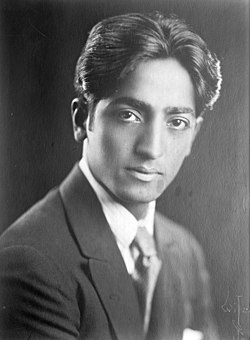Jiddu Krishnamurti Quote
Related Quotes
Some of the most evil human beings in the world are psychiatrists. Not all psychiatrists. Some psychiatrists are selfless, caring people who really want to help. But the sad truth is that in today's s...
Rebecca McNutt
Tags:
asocial, child innocence, childhood, colleague, creepy, crime, disorder, drug company, drugs, ethics
Never say that you can't do something, or that something seems impossible, or that something can't be done, no matter how discouraging or harrowing it may be; human beings are limited only by what we...
Mike Norton
Tags:
accomplish, can t, chastisement, conqueror, discouragement, disorder, doubt, dream, empowerment, exile
About Jiddu Krishnamurti
Jiddu Krishnamurti ( JID-oo KRISH-nə-MOOR-tee; 11 May 1895 – 17 February 1986) was an Indian philosopher, speaker, writer, and spiritual figure. Adopted by members of the Theosophical tradition as a child, he was raised to fill the advanced role of World Teacher, but in adulthood he rejected this mantle and distanced himself from the related religious movement. He spent the rest of his life speaking to groups and individuals around the world; many of these talks have been published. He also wrote many books, among them The First and Last Freedom (1954) and Commentaries on Living (1956–60). His last public talk was in January 1986, a month before his death at his home in Ojai, California.
Krishnamurti asserted that "truth is a pathless land" and advised against following any doctrine, discipline, teacher, guru, or authority, including himself. He emphasized choiceless awareness, psychological inquiry, and freedom from religious, spiritual, and cultural conditioning. His supporters — working through non-profit foundations in India, Britain, and the United States — oversee several independent schools based on his views on education, and continue to distribute his thousands of talks, group and individual discussions, and writings in a variety of media formats and languages.
Krishnamurti asserted that "truth is a pathless land" and advised against following any doctrine, discipline, teacher, guru, or authority, including himself. He emphasized choiceless awareness, psychological inquiry, and freedom from religious, spiritual, and cultural conditioning. His supporters — working through non-profit foundations in India, Britain, and the United States — oversee several independent schools based on his views on education, and continue to distribute his thousands of talks, group and individual discussions, and writings in a variety of media formats and languages.
